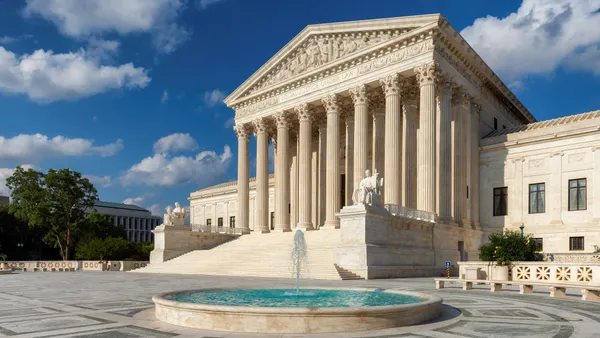Maine could be at risk of having to repay up to $864 million in federal education funds should the state lose a U.S. Department of Justice lawsuit filed last week over its policy for transgender students' participation on women and girl's sports teams.
In filing the suit, the Justice Department warned that it might even retroactively pull funding to Maine for past Title IX violations. Now, the Department of Justice has clarified how much is on the line: $864 million in federal funding, $202 million of which the state has yet to spend, according to a Justice Department email to K-12 Dive on April 18.
As a result of the April 16 lawsuit, which seeks to end the state's transgender athletics policy, the court could order that the Maine Education Department pay back part or all of that $864 million.
The lawsuit, which alleges Title IX violations, also asks the court to award damages to the United States and "establish a process to compensate female athletes who have been denied equal athletic opportunities due to Defendant's violations, including correcting past athletics records." The case was filed in U.S. District Court for the District of Maine.
The recall of federal dollars from the state over civil rights violations would be an unprecedented move, considering state systems have never been severed from federal funds over sex discrimination claims, according to Title IX lawyers. While the federal government has always had the power to rescind funding in certain situations, schools, districts and states more often than not enter a voluntary agreement of compliance with the department — avoiding legal action and preserving their funding from the Education Department.
However, that may no longer be the case, education civil rights attorneys following Maine's case have said. This administration's brief investigations into alleged violations and high stakes consequences may instead be a new normal.
“For nearly two months, Maine has endured recriminations from the Federal government that have targeted hungry school kids, hardworking fishermen, senior citizens, new parents, and countless Maine people," said Maine Gov. Janet Mills in an April 16 statement in response to an announcement that Justice would be filing the lawsuit.
"We have been subject to politically motivated investigations that opened and closed without discussion, leaving little doubt that their outcomes were predetermined,” Mills said.“Let today serve as warning to all states: Maine might be among the first to draw the ire of the Federal government in this way, but we will not be the last.”
The Education Department's Office for Civil Rights, which was in charge of conducting theTitle IX investigation into Maine prior to the department's decision to hand off enforcement to the Justice Department, said in a March 31 statement that it was "moving quickly to ensure that federal funds no longer support patently illegal practices that harm women and girls.”
The Education Department initiated the case after President Donald Trump had a public spat with Mills in February over the state’s athletics policy allowing transgender students on women and girls’ sports teams.
The quarrel precipitated parallel investigations by the U.S. Department of Health and Human Services —- which concluded its investigation in four days —- and the Education Department, which finished its investigation in less than a month. In prior administrations, such probes took months and even years.
"OCR under this Administration has moved faster than it ever has," U.S. Secretary of Education Linda McMahon said in an April 4 statement announcing a special joint Title IX investigations team from the Education Department and Justice Department, which will take over enforcement responsibilities in transgender student athlete cases similar to Maine's.
U.S. Attorney General Pamela Bondi, who filed the Justice Department lawsuit, said last week in a press conference announcing the historic move that "many, many" other states, including California and Minnesota, are at risk of losing federal funding over alleged civil rights violations.







 Dive Awards
Dive Awards







